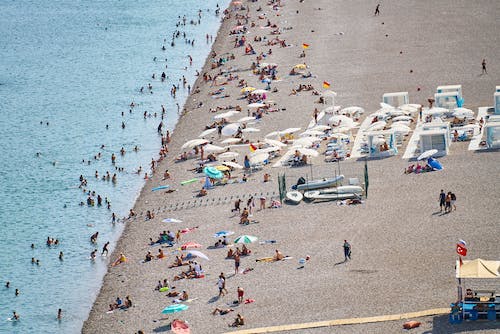Traveling around the world has never been easier, allowing us to explore cultures different from our own. Whether you’re crossing the ocean for the first time or heading somewhere more familiar, it’s important to remember that different places have different ways of doing things. To ensure your travels are enjoyable, respectful and safe, there are valuable cultural etiquette tips each traveler should be mindful of. Learn more about traveling with respect in this article about cultural etiquette: respectful travel tips for different cultures.
1. The Art of Cultural Resilience – Respectful Travel Tips
1. Respect the Locals
Cultural resilience means that we must be mindful of the fact that all cultures are different. While travelling it’s important to respect the cultures and behaviors of locals. Speak to the locals, learn about their customs and try to respect their cultural norms. It’s not only courteous, but it will also help with day-to-day interactions. For instance, a gentle smile and warm greeting is an effective way to break the ice in many countries. It’s always a good idea to research the area you are visiting, as this will make it easier to be respectful and courteous.
2. Show Appreciation
When visiting a new culture, it’s important to show appreciation of the local people and their culture. Offering compliments on local customs, music and food is a great way to express appreciation for the region’s heritage and build appreciative relationships with locals. Additionally, purchasing and displaying local products is an easy way to show your respect and gratitude for local traditions and customs. These easy gestures can go a long way in making a positive impression on the local people.
3. Understand the Local Language
Learning some of the language of the region is essential for effective communication and respecting cultural norms. Even though different countries may have different languages, there are a number of common phrases that are essential for courteous interactions. These include traditional salutations, asking permission when taking photographs, granting permission to enter, and requesting/offering help. Additionally, having access to a basic dictionary of local language is essential for communicating.
4. Follow Local Customs
Researching the local culture before visiting is an imperative part of cultural resilience. Even small conversations with locals can go a long way in understanding local customs, superstitions, religious ceremonies and beliefs. Being informed on local customs and religious protocols will help you navigate different situations and prevent any unintentional disrespectful behavior. Additionally, it’s important to note that, in some cultures, physical contact or public displays of affection between unmarried couples may be prohibited. Being aware of certain local cultural norms can help you remain respectful and avoid any embarrassing situations.
5. Preserve Nature and Environment
It’s important to remember to respect the environment as you travel. Be mindful of the volume of your voice, the waste you create and the birds, animals and plants around. Avoid littering and do not buy souvenirs made of endangered animal parts. Whenever possible, try to find ways to help preserve nature and keep it clean. Additionally, do some research before booking a tour or an accommodation to make sure that it has a sustainable approach. Show appreciation for the beauty of nature, always carry out what you take in, and be knowledgeable about the habitat before travelling.
2. Exploring the World with Open Eyes and Open Minds
1. Sightseeing
, we come across many interesting and often stunningly beautiful sights. From exotic animals in the Savannah to breathtaking waterfalls in the jungle, nature has a wide range of scenery to offer us. And there is much more beyond that. Historical sites like the Acropolis in Athens or the Great Wall in China tell us stories of old civilizations. Walking through a big city, we can observe bright lights, admire modern architecture and lose ourselves in its cultural diversity. No matter the destination, sightseeing is a great way to admire the beauty of Planet Earth and learn more about different places and cultures.
2. Eating
Who can deny the therapeutic joy of a mouth-watering meal? To some, it is an art, a delicious science that explores interesting new combinations of ingredients to create a one-of-a-kind taste. From the ruby red hue of the traditional Italian pizza and the fish-fragrant dim sum of southeast China to the sweet and spicy flavors of Mexican food, every country in the world brings unique flavors to the table. Eating is a great way to experience the world without necessarily having to leave home.
3. Going Out and Meeting People
Connecting with locals is a great way to experience a destination beyond the tourist-filled guidebooks. Going out to pubs and dance clubs, attending festivals and meeting people in the city can give us a chance to dive into a different culture and to learn about it from the people’s perspective. Being open to new experiences and trying to engage in conversations instead of staying in the sidelines can open many windows of discovery.
4. Trying the Local Activities
Sometimes, means getting off the tourist bus and into the local culture. Whether it is partaking in traditional dances, joining religious ceremonies, or trying out activities like surfing or snowboarding, there is a massive variety of thrilling experiences that we can enjoy as locals do. Stepping outside our comfort zone can be a refreshing break and an excellent way to create life-long memories.
5. Learning the Local Language
Language is the gateway to true cultural understanding, and mastering a few useful phrases can be the ticket to experiencing a culture from the inside out. Even if tourists speak English quite fluently, understanding–and being understood–in a foreign language can give us a different perspective. It is also a great way to show respect to the locals who are kind enough to welcome us in their home-country.
- Learning the basics phrases like “Hello” or “Thank you” is an excellent start when traveling in a new place
- Learning the proper pronunciation is key, as tones may change meanings of words
- It also can be extremely helpful to learn a few common phrases of the local language
- Findtime to engage in conversation in with the locals – this is an excellent way of practicing the language
Having an understanding of the language and culture gives us the opportunity to immerse ourselves in the local customs and foster a unique experience.
3. Customs and Traditions: What to Expect When Visiting Different Cultures
Experience independent cultures and arguably, the most beautiful parts of traveling—the customs and traditions, are one of the most enriching! Just below the surface of the unfamiliar is a doorway to a more intimate understanding of different cultures.
- To truly immerse yourself into the culture, start by learning a few phrases in the local language! It’s both a show of respect and a friendly gesture that will help immensely in interacting with others.
- Do your research on the local food—opt for what’s in season, and keep an open mind too! Traveling is the perfect opportunity to break out of your food comfort zone.
Greet people with respect and learn about traditions like handshakes, bows, and other traditional gestures. Never taking a photograph without asking permission is also an important rule to remember. Historical places, religious sites, and monuments in certain cultures might come with certain do’s and dont’s. Always double-check if in doubt.
Gift Giving
Gift-giving also saves the day in many cultures, and it is an incredibly generous way of expressing appreciation. First, it’s wise to take note of any gift-giving taboos. If you’re in Russia, avoid giving an even number of flowers as they are only gifted to the deceased. Negotiating or haggling is the norm in some cultures like in Middle Eastern countries. There could also be certain taboo topics to be mindful of in social interactions, like politics, religion, or even the weather.
4. Unlock the Riches of Multiculturalism: Learn the Basics of Cultural Etiquette
As our world continues to globalize, it is no longer enough to be aware of the customs and values of our native cultures—we need to understand the unique nuances of other cultures as well. Unlocking the riches of multiculturalism is not a daunting task. Here are some basic tips to make the most of every cultural encounter.
- Show Respect. Above all else, the most important rule of cultural etiquette is to show respect for the culture and its people. Behave in a respectful and gracious manner.
- Be Flexible. The key to cross-cultural communication is the ability to be flexible. Recognize that the customs, values, and expectations in other countries, and even between countries, vary greatly. Don’t expect every society to act in exactly the same way as yours.
Remember that there is no one-size-fits-all approach to cultural etiquette—it is important to be willing to learn and adjust to each individual encounter. Cultures don’t just differ in terms of language and dress, but in terms of social norms, communication, and social interaction as well. Respect the differences, and understand that everyone approaches life in a unique way.
- Ask Questions. If you do not understand something, it is perfectly acceptable to ask questions in a respectful manner. It is important to pay attention to body language, gestures, and other cues to best assess the situation.
- Be Patient. Whenever you are dealing with another culture, it is essential to be patient. Don’t rush people, and take your time to fully understand what is being communicated.
Be mindful of your cultural surroundings and strive to make a good impression. With these simple tips, you can unlock the riches of multiculturalism and reap the many benefits that come from having a heightened understanding of cultural etiquette.
No matter where you travel, the most important lesson is to be respectful of the different cultures and traditions you will encounter. Whether you learn the most important customs and etiquette of the place you are visiting, or simply make an effort to be mindful, respectful travel will help create a meaningful, fulfilling experience. So be sure to keep these etiquette tips in mind and have a wonderful journey!


